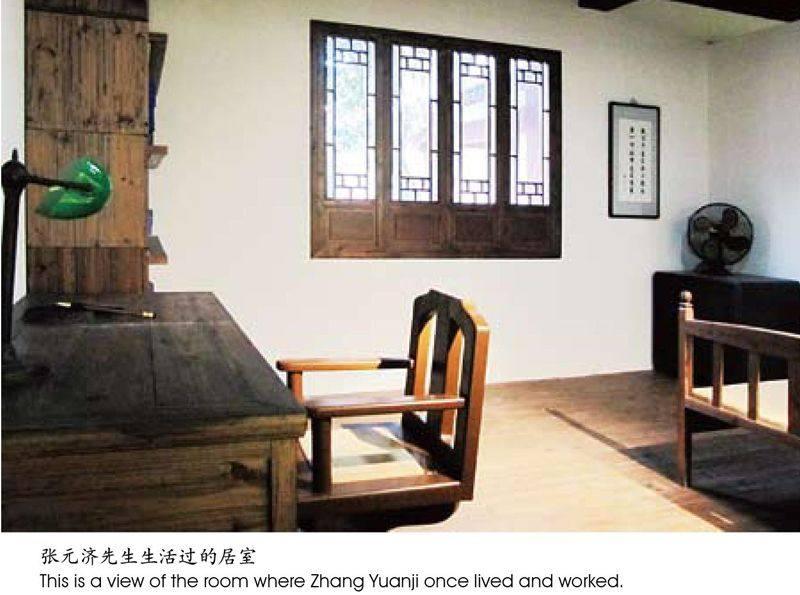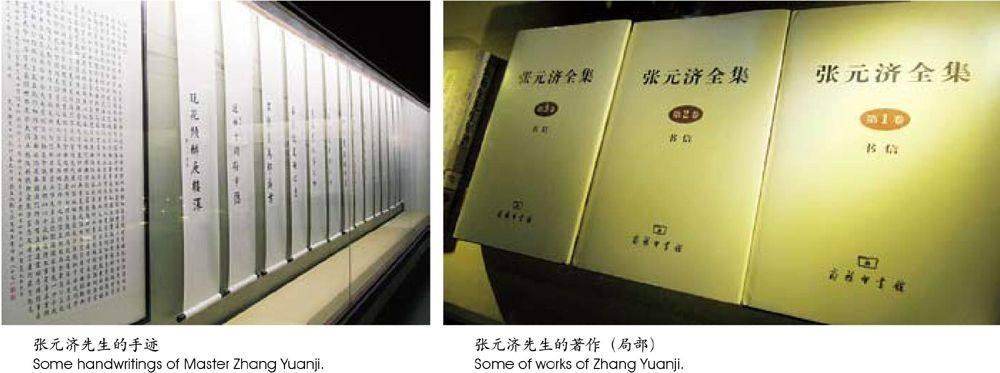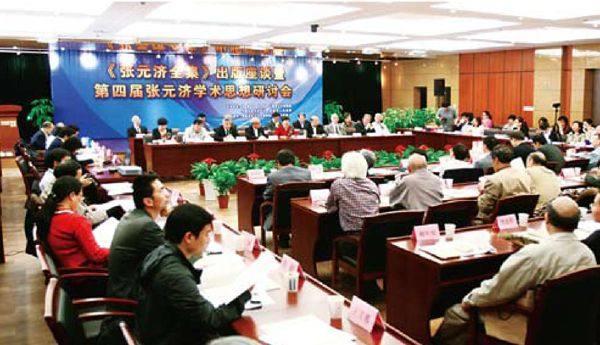志在报国 德泽千秋
2012-04-29陆梦婷
陆梦婷



今年是张元济先生诞生145周年。张元济,号菊生,浙江海盐人,著名教育家、出版家和文献学家,对我国文化教育及出版事业作出卓越贡献。清末与蔡元培同中进士。1902年,张元济进入商务印书馆历任编译所所长、经理、董事长等职;中华人民共和国成立后,担任上海市文史研究馆首任馆长,著有《校史随笔》等。1959年8月14日在上海逝世。
秋色正浓,一墙之隔的海盐新桥路车水马龙,人声鼎沸,而张元济纪念馆掩映在繁茂的树木中,似乎与喧嚣的外界隔绝。粉墙黛瓦,池水环绕,千尾红鲤,纪念馆透着淡雅的江南韵味。
在海盐绮园文化区,张元济图书馆坐落在这里,而“张元济纪念馆”就在图书馆的东区。“张元济纪念馆”,原名“张元济先生纪念室”,1987年开放,陈列着张元济先生的著作、手稿和生平事迹资料,20多年来已接待参观者近10万人次。张元济先生的哲嗣张树年先生、嫡孙张人凤先生、孙女张珑女士先后捐赠了珍贵文物。随着几次重修,目前,纪念馆面积已达1000多平方米。
步入纪念馆的展厅,古铜色的张元济先生雕像映入眼帘。先生坐在藤椅里,拄着拐杖,眼睛凝视着前方。“吾宗张氏,世业耕读,愿吾子孙,善守勿替。匪学何立,匪书何习,继之以勤,圣贤可及”,在雕像的背后,楠木板刻的家训令人印象深刻,这是张元济的十世祖张奇龄立下的。张奇龄是明万历进士,以学识渊博驰誉江南,人称大白先生。在海盐县城南门外乌夜村筑读书处“大白居”。后“大白居”拓建,改名“涉园”,并开始蓄意藏书。延绵数代,“涉园”名重一时,以藏书、刻书、读书著称。
张元济就出生于这样的书香世家。其父张森玉,清末历任广东会同、陵水(今海南)等县知县,娶江苏武进谢焕曾之女为妻。1867年10月25日(清同治六年丁卯九月二十八日),张元济生于广州。张元济幼时随父居住,7岁入塾接受传统教育,14岁时随母返回故乡浙江海盐,在县城虎尾浜的旧屋居住生活。
张元济16岁时开始了科举考试生涯。后来,张元济中进士,入翰林院任庶吉士。
1898年,清光绪二十四年,这戊戌之年是中国近代史上值得大书特书的一年。维新人士积极组织学会,创办报刊,讲求新学,宣传变法,在知识分子中形成了一种前所未有的新社会风气。张元济热心参与维新聚会,主张维新,并积极投身变法,提倡改革。他向光绪帝上《痛除本病统筹全局以救危亡折》,力主废科举,取消八股文等,受到光绪召见。戊戌变法失败,张元济被“革职永不叙用”。
戊戌变法的失败使张元济认识到,“任何政治改革强加于冷漠、毫无生气和愚昧无知的大众,必然毫无结果”。百年中国,许多人都在寻找富强中国的道路,当年知识分子走上“文化救国”道路的不在少数,张元济选择了出版。他创办印书馆,创办讲习班和函授学校,兴办图书馆、整理和出版古籍,出版教科书……
“以扶助教育为己任”的社会责任感使得他执掌后的商务印书馆影响了百年中国的进程,商务印书馆也完成了从印刷工厂到出版巨子的蜕变,成为晚清以来,普及、传播新知新学的文化重镇,其开辟的教材风格也成为多年以后无数人怀念的范本。
时至今日,张元济所倡导的“昌明教育,开启民智”依然有着巨大的影响。今年4月26日,为纪念张元济先生诞辰145周年,海盐举行第四届张元济学术思想研讨会。在会上,香港联合出版集团总裁陈万雄认为,张元济将文化出版理念与企业精神完美融于一身,对中国近现代出版乃至文化教育居功至伟,“我们缅怀他,更应该从中挖掘出对现实乃至未来中国文化发展可资借鉴的宝贵财富。”中国出版集团副总裁王涛认为,张元济主持出版的新教科书,为那一代中国人扫盲、开启民智发挥了作用。他对外引进西学,改变了中国文化几千年来独尊儒术的局面。
“薄有文章传子弟;更无书札答公卿”、“无求便是安心法;不饱真为却病方”、“得山水情其人多寿;饶诗书气有子必贤”、“凡事总求过得去;此心先要放平来”……在纪念馆,张元济先生工稳淳雅、隽永凝丽的手迹也在展陈之列,古拙中有清秀,可体味其情怀与风骨。
在八年抗战时期,他展现出了铮铮风骨。张元济当时蛰居上海,拒绝与日伪任何形式的合作,因为生活艰难,只能靠卖字维持生活。然而,当伪浙江省省长傅式悦托人带来一幅画和伪钞11万元,要他在画上题字,却被拒绝。日本人来其居所求谈,张元济写字条“两国交战,不便接谈”交付。
1948年,张元济手书了《新治家格言》,道出了自己的观点:“人贵自立,须知有志竟成。”他时时不忘汲取知识,提高自身修养。“数百年旧家无非积德;第一件好事还是读书。”这是张元济晚年所写的一副楹联。在张元济纪念馆内,处处可见这幅楹联。在纪念馆展厅的西侧,还原了张元济先生的生活痕迹。简易的木床、书桌,带着时代烙印的绿色台灯和风扇,除此外,整洁干净的房间中最引人注意的就是书柜上层层叠叠的书籍和床头这副再熟悉不过的对联。
因为“第一件好事还是读书”,张元济先生一直牵挂着家乡的教育。发黄的老照片,宽敞的房屋,围坐在一起的学生。在纪念馆,翻印的老照片记录了张元济捐宅办学的故事。1945年秋,海盐创办了县立初级中学。1946年秋,校舍一时无着,学校与张元济磋商租借先生祖宅。先生慨然应允,将坐落在虎尾浜南岸的故居和六亩五分宅基地借给海盐县立初级中学使用,学校每年只象征性地付租费大米一石。
现在的纪念馆还原有张氏旧宅的模型图,宅子世称“张家翰林第”,共有三进,共三十六间房屋。院子里有着太湖石、葱翠的树木和家禽。“愿将祖遗坐落城内虎尾浜现租与县立中学使用之房屋全所并余地捐与该中学为校舍”。1951年4月,84岁高龄的张元济已瘫痪,但心里仍挂念着家乡教育,希望捐赠祖宅。当海盐中学在全校师生大会上宣读张元济的捐赠证文时,掌声雷动,经久不息。此外,张元济还搜求保存地方文献,一生搜求、保存海盐先哲遗著355部,计1115册。
张元济一直渴望家乡能有一个公共图书馆。早在1921年,他就和同乡朱希祖议过此事,但他的这个愿望因为种种原因一直未能实现。为了实现他的遗愿,海盐县委、县人民政府于1987年建起了以张元济名字命名的公共图书馆——张元济图书馆。2010年,政府又出资4000多万元进行扩建,使之成为具有10000多平方米的现代化的公共图书馆。1999年,建起了省重点中学——海盐元济高级中学及涵芬图书馆。2002年在原海盐中学的基础上建起了海盐高级中学。最终实现了张元济对家乡海盐的图书馆建设和教育事业的殷切愿望。
《近代出版家张元济》《张元济》《张元济轶事专辑》《张元济诗文》《仁智的山水张元济传》《从翰林到出版家——张元济的生平与事业》《张元济书札》《张元济蔡元培来往书信集》……自上世纪80年代以来,学术界、出版界掀起了一股张元济研究“热”。在展厅的尽头,几个大展柜形成回字形,展示了诸多张元济研究专著。
在纪念馆参观后,相信每个人对中国近代知识分子的杰出代表张元济先生其人,对我国近代出版、文化、教育事业的发展史,对他所生活的时代都会有一个更为清晰的了解。
Zhang Yuanji Memorial Museum
By Lu Mengting
Zhang Yuanji (1867-1959) was one of the most famous publishers of the first half of the 20Th-century China. A brief look into his family history would reveal that it was by no accident that Zhang became a publisher. A native of Haiyan, Zhejiang Province, he came from a family whose roots were in education and books for centuries. Zhang Qiling, an ancestor of the family, was a cosmopolitan graduate during the years of Emperor Wanli of the Ming Dynasty (1368-1644). Zhang Yuanji was a 10th-generation descendant from Zhang Qiling. The family pursued education and many family members became government officials after passing imperial examinations. Zhang Senyu, Zhang Yuanjis father, was a county magistrate in Guangdong Province. Zhang was born in Guangzhou in 1867 and went to a private school at the age of seven. At 14, he came back with his parents to Haiyan.
The junior began to take imperial examinations at grassroots level at the age of 16. Like his great grandfather in the Ming Dynasty, Zhang Yuanji also became a cosmopolitan graduate. He took active part in a reform toward the end of the 19th century. The reform lasted only 100 days. After the abortion of the reform, Zhang was dismissed from the government post. He turned to education and publishing. The Commercial Press, arguably the most prestigious publishing company in China of the 20th century, is closely associated with the name of Zhang Yuanji.
Zhang Yuanji joined the Commercial Press in 1901. Almost single-handedly, he built up the Commercial Press and turned it into a national fame. Under his guidance, the Commercial Press published textbooks, translations of books by great scholars of the West, and Chinese ancient classics. Before the publishers major assets and library in Shanghai were destroyed in 1932 in a Japanese bombing, the Commercial Press was the number one book publisher of China: it published almost all the textbooks for schools across the country and enjoyed a 52% share of the national book market.
Zhang Yuanji stayed in Shanghai during Japanese occupation in war years, but he refused to have anything to do with the Japanese puppet regime or Japanese themselves. He sold his calligraphic works to make a living.
Haiyan, his hometown in Zhejiang, now has Zhang Yuanji Library and Zhang Yuanji Memorial Museum in honor of the publisher. The museum is a upgraded version of Master Zhang Yuanji Memorial Room, which opened to the public in 1987. The museum has a collection of Zhangs books, manuscripts and materials that combine to tell the life story and achievement of the publisher. Over the past 20 plus years, nearly 100,000 people have visited the museum. His son, grandson and granddaughter have donated exhibits to the museum. Thanks to a few restoration and expansion projects, the museum now measures about 1,000 square meters.
Zhang Yuanji most ardently supported education undertakings in his hometown. In the autumn of 1945, Haiyan set up its first county-level primary school. In the autumn 1946, the school contacted Zhang Yuanji to see if it was possible to rent Zhangs ancestral house for dorms and classrooms. Zhang not only agreed to rent the house to the school but also lent a 4,300-m2 empty site preserved for building a house to the school. He charged a nominal fee of 50-kilogram rice a year. In April 1951, the 85-year-old Zhang donated the house to the school.
During his lifetime, Zhang Yuanji built up a private collection of books authored by Haiyan natives. The collection had 1,115 books in 355 titles. As early as 1921, he talked with a fellow native for establishing a public library in Haiyan. His dream never came true for various reasons. In 1987, the local government set up a library and named it after Zhang Yuanji. Thanks to a 400-million-yuan expansion project in 2010, the library is now a 100,000-m2 affair with a full range of apparatus and devices.
Since the 1980s, scholars have been paying attention to Zhang Yuanji, his contribution to Chinas modernization in the 20th century, and his legacy. Many books have been published to understand his life and his contribution. His biographies have been published. His essays, poems, letters have been published. The museum has a number of display cases that show study results on Zhang Yuanji.
The museum showcases Zhang Yuanji and his contribution to the modernization of China in the 20th century.
